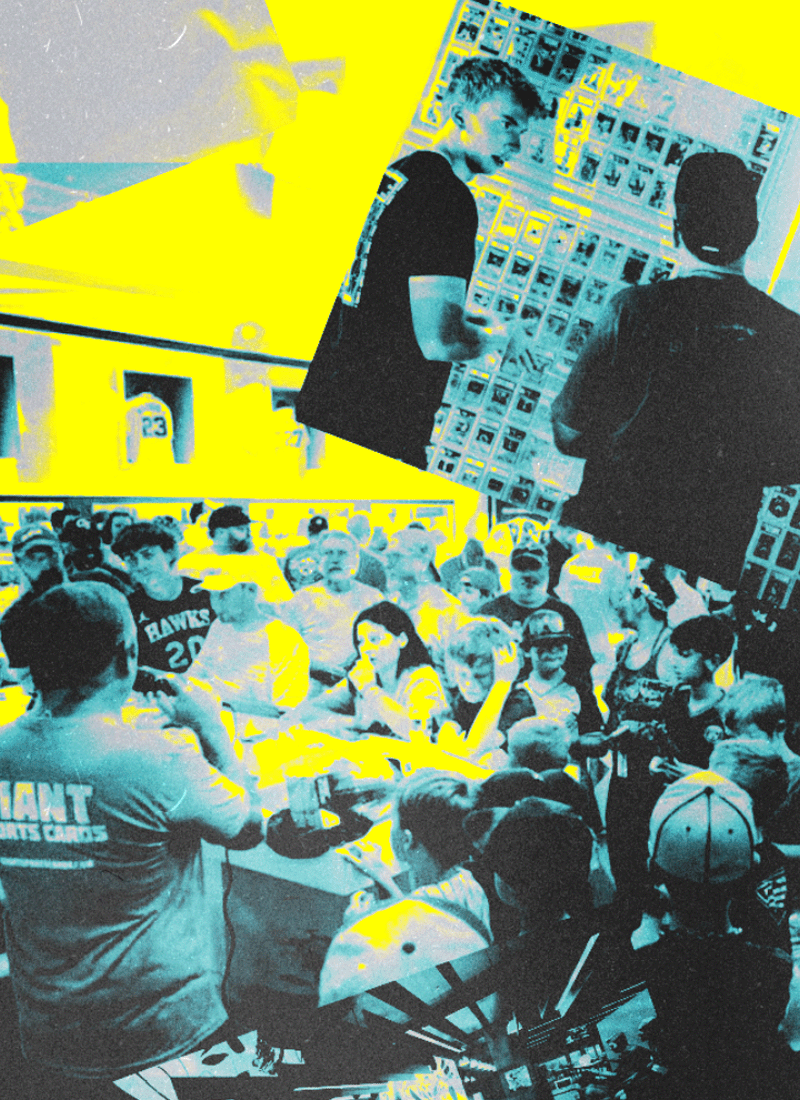
Elevating the LCS Experience
Stop into any retail Apple Store, and it’s apparent what kind of appearance the company strives for. It’s an eye-appealing, modern design with bright lights and ample space for community gatherings.
That 21st-century look, along with utilizing cutting-edge technology, has found its way into trading card hobby shops. Owners are putting a much-needed, fresh spin on their new brick-and-mortar stores.
In this day and age, where customers can jump online and buy a box of cards at any time with just a couple of clicks, physical hobby shops must stand out and have their own niche.
New brick-and-mortar shops give collectors more in-store options, enticing them to stop in. That includes getting on-site advice about their collection, being able to submit cards for grading, joining a break in person, buying a box and ripping wax on sight with friends, or just chilling and watching a major sporting event on a big screen TV.
“Everyone’s doing it in their own way because there’s not one standardized hobby shop,” said Aaron Amarant, who owns AA Mint Cards in Cooper City, Florida. “So, you have some cool innovations going on everywhere because all the hobby shops are essentially independent.”
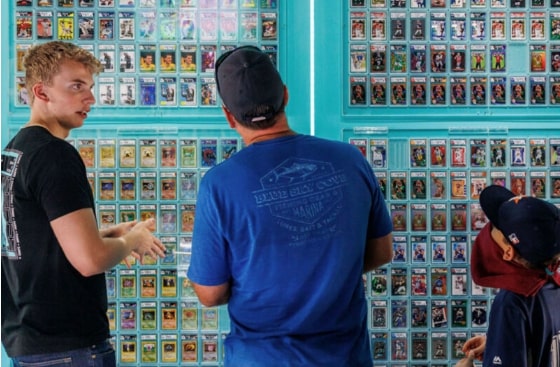
“The card industry has come a long way, but it still has a long way to go. I think it’s just a natural symptom of progression is what’s going on with the modern card shop.”
LCS Providing an Experience IRL
Topps RIPPED talked with four hobby shop owners from around the country who have fully integrated the modern-day look and feel within their stores.
For hobby shops to thrive, it isn’t just about the store’s look. It’s dependent on providing the customer with a great, memorable experience through interactive activities.
“I think what hobby shops have to do to keep up is make it more of an experience that the customers can enjoy, which you can’t get online. You have to be different than that,” Amarant said. “Online will always be cheaper than you, no matter what you do, because you have to turn on the lights somehow. So, I think creating an authentic and unique experience is paramount. That’s where the value is in our hobby shops and where they need to be to become modern.”
Amarant and his dad, Mark, want to provide an exceptional experience for every age, range of income, and collector type.
“The key thing we want to give them is a smile,” Amarant said. “If they’re just here because they saw the Charizard on the side of the wall or they’ve been collecting for 20 years, we want to show them, hey, we love what you love. We’re here to help facilitate that however you want, whether providing services, new products, or whatever someone wants. We want to make our store like an arm of their collection.”
That experience is precisely what Geoff Wilson will strive to give customers when his 14,000-square-foot CardsHQ shop opens in Atlanta on February 1. The founder of Sports Card Investor believes shops need to be more about the experience and less transactional.
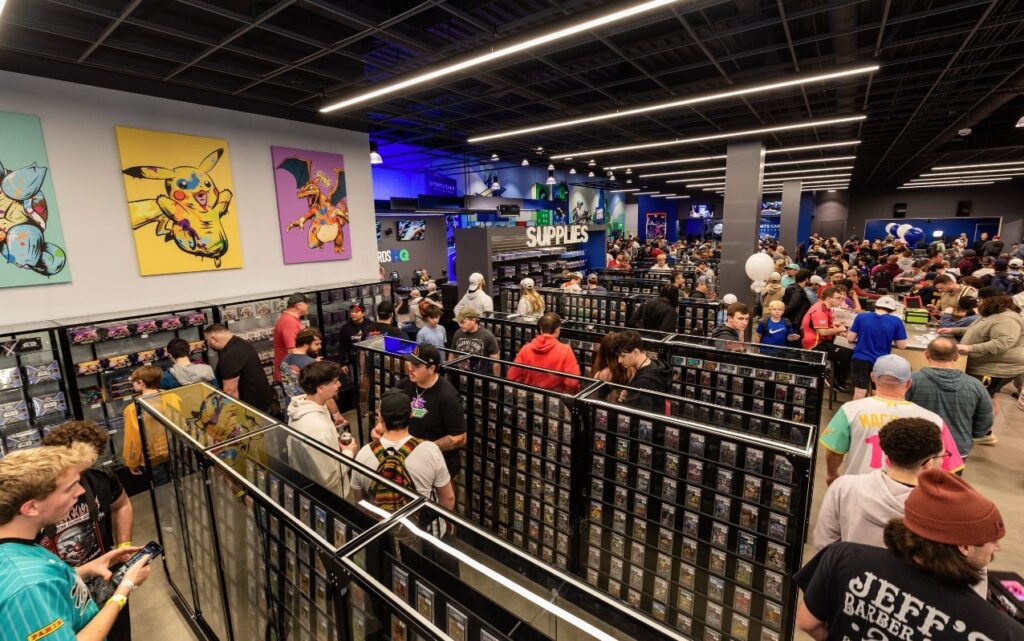
“I think that retail, in general, is moving in that direction in our country,” Wilson said. “If you’re just transactional, people can buy off the web and probably find better pricing and have it delivered to them the next day. There’s no compelling reason for somebody to walk into your card shop if you’re just transactional.”
Dan Anderson — co-owner of Mojobreak Sports Cards in Santa Ana, California — knows it’s critical to cater to his highly educated clientele.
“I think it’s kind of where we’re at as a society,” Anderson said. “When you go to buy something, unfortunately, everybody is on the go, and you want to get in and sometimes get out. You want to make it as easy as possible.”
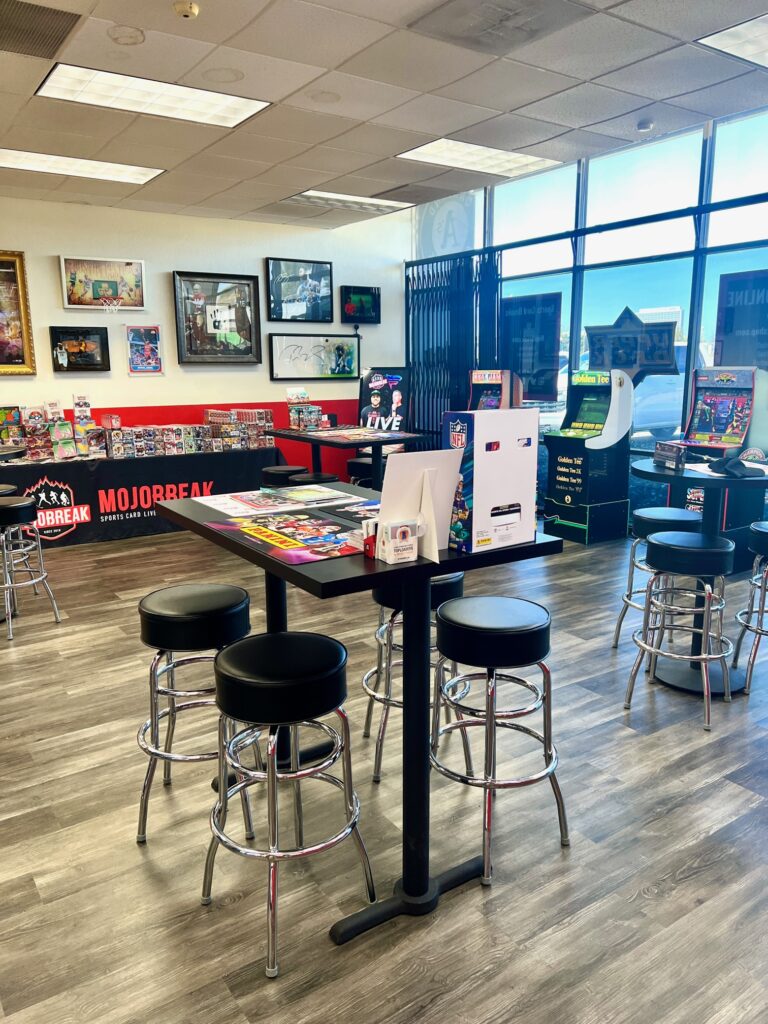
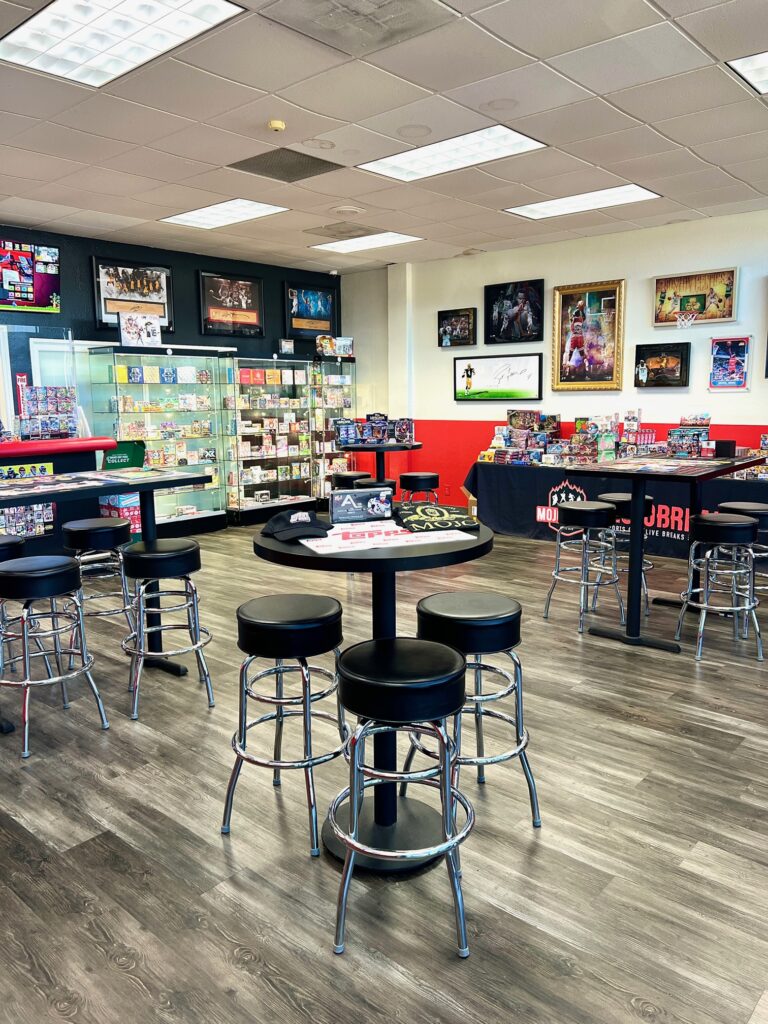
Large-scale online retail outlets provide quick and easy shopping for customers just one click away from any purchase.
“People have that mentality, so you’ve got to over-deliver because you’re competing with the Amazons,” Anderson said. “So, you’ve got to make the process of face-to-face commerce as easy as possible.”
Greg Rouse quickly notes he models his shop — Hit Seekers Sports Cards in Fort Mitchell, Kentucky — after an Apple Store; he emphasizes extraordinary customer service.
“When consumers come in the door, whoever is working, they’re out on their feet; they’re greeting these people,” Rouse said. “But they’re not bothering them because they’re not car salesmen. They’re making themselves available for consultation or whatever’s needed. That’s extremely important because we have a very young client base. We have a lot of kids that shop here often; they coerce their parents, who may not have in-depth knowledge of the hobby, to bring them in. So a solid consultative piece goes on with it.”
Unique In-Store Features
Hobby shops that have opened in the last few years provide unique features for their customers.
When AA Mint Cards opened on January 20, the 2,400-square-foot location featured several distinctive design traits. On the walls is a Graded Retail Interactive Display (GRID) system with six grids filled with PSA slabbed cards and six grids with SGC slabs, totaling just over 1,000 cards. Each card has a QR code that customers can scan and quickly receive the card’s price, high-resolution images of the front and back of that card, and the population report. All that information is available with just a few clicks on a phone.
“Not only does it visually look amazing, but the patent-pending technology behind it is really what makes our business able to display so many slabs in so many different places simultaneously,” Amarant said. “Without that, it would be hell on Earth keeping track of all this.”
Another unique feature on display at AA Mint Cards is a sports ticker. Running along the top of an entire wall, the ticker continuously runs professional sports game scores, scheduled events, and breaking news in the sports world.
AA Mint Cards also has an on-site concierge who reviews cards before they are submitted for grading. The concierge tells the collector whether or not to send in a card based on what grade it could receive.
When Wilson started mapping out his design for CardsHQ, he came up with plenty of unique elements. He’s proud to feature what he proclaims as the world’s first breaker arena.
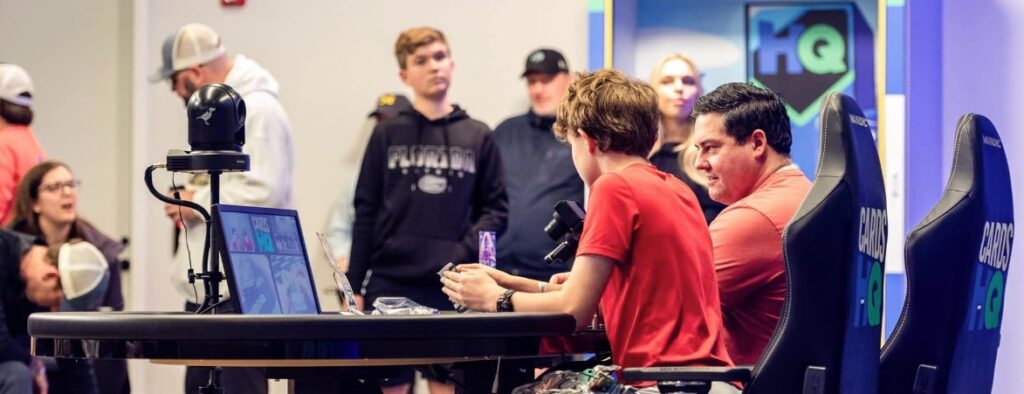
“This is a custom, poker-style table specific for breaking cards,” Wilson said. “The bleachers that we have set up so that people can sit and watch people sit at the table and open up cards. The table is wired up with card cameras, which feed to TVs. People can sit on the bleachers, watch someone open a box, and see a close-up feed of exactly what the person’s pulling out of the box. … It’s a really cool, community-driven feature.”
CardsHQ will be hosting breaks that combine people online and in-store. There are six breaking and live-selling studios in the store, which emphasize the interactive approach.
“The way that we have set all of them up is they’re all open to the store, meaning they’re right along the edge of the show floor. They’re not shut off in a back room, and they’re not glassed in,” Wilson said. “So, while you’re in the store shopping, you can walk over and see what’s happening, see what people are breaking right at that moment.”
Anderson, who opened Mojobreak Sports Cards in 2019, has implemented technology within his store. He has a point-of-sale system that is integrated with his e-commerce site.
“You scan a QR code in a showcase, and it will take you to everything that’s in that showcase on the site, and it has all the prices and quantity,” Anderson said. “It also makes it so much easier from a retail aspect because the prices fluctuate daily. So, I wanted to avoid paying somebody in the shop to re-write handwritten price tags every few days. I wanted it to be completely automated.”
Anderson’s shop is exceptionally kid-friendly. He enjoys hosting watch parties, especially when the nearby San Francisco 49ers are playing. The owner provides pizzas and refreshments for the kids who can watch a game on a four-panel, 105-inch TV.
“We make it more of like a card shop but also with a sports bar vibe that obviously doesn’t serve alcohol,” Anderson said. “But it tries to get that sense of community and bring the collector closer.”
When Rouse designed Hit Seekers Sports Cards, it was vital for him to have an organized and well-laid-out store.
“I like cleanliness, organization, well stocked but not overstocked — not hundreds and hundreds of white boxes laying everywhere,” Rouse said. “It needs a good appearance, and it needs to be shoppable. It has to make sense. You have to be able to find things as a consumer.”
Rouse’s idea of a modern store included a taste of America’s pastime.
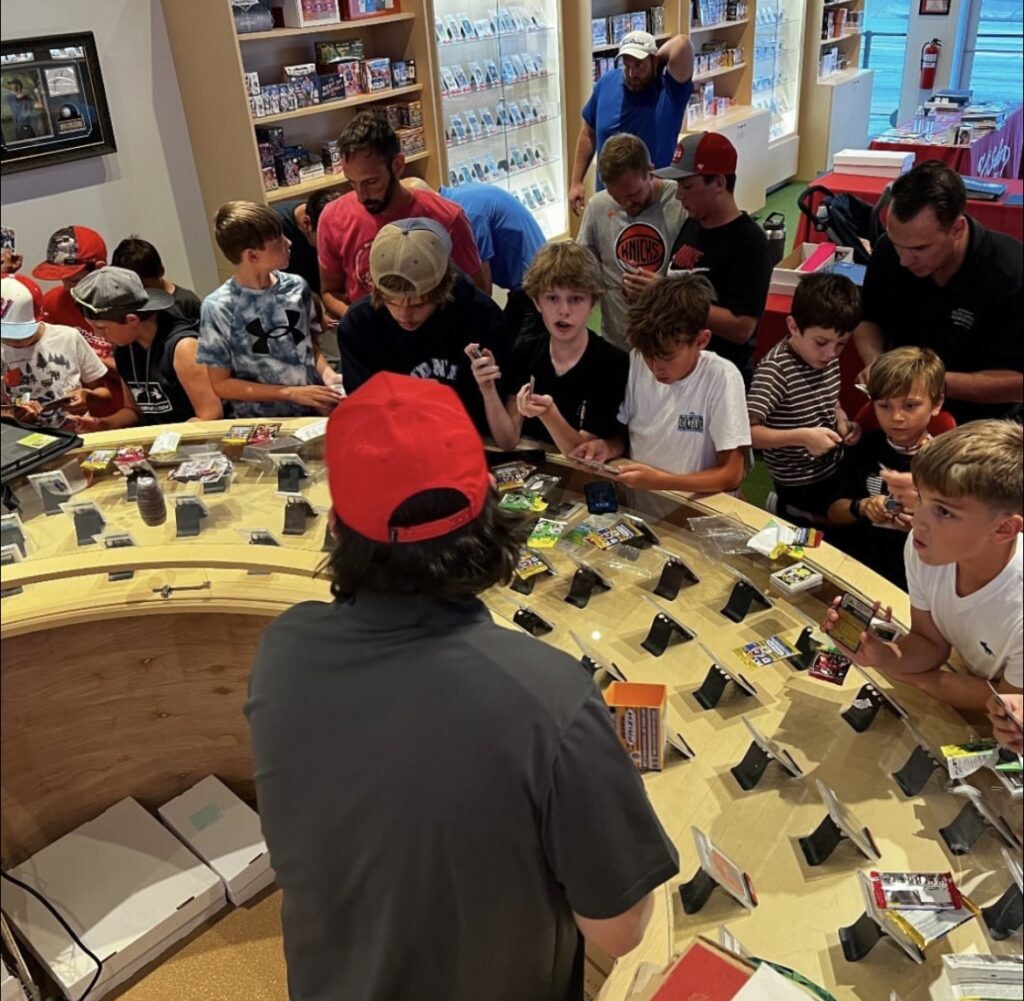
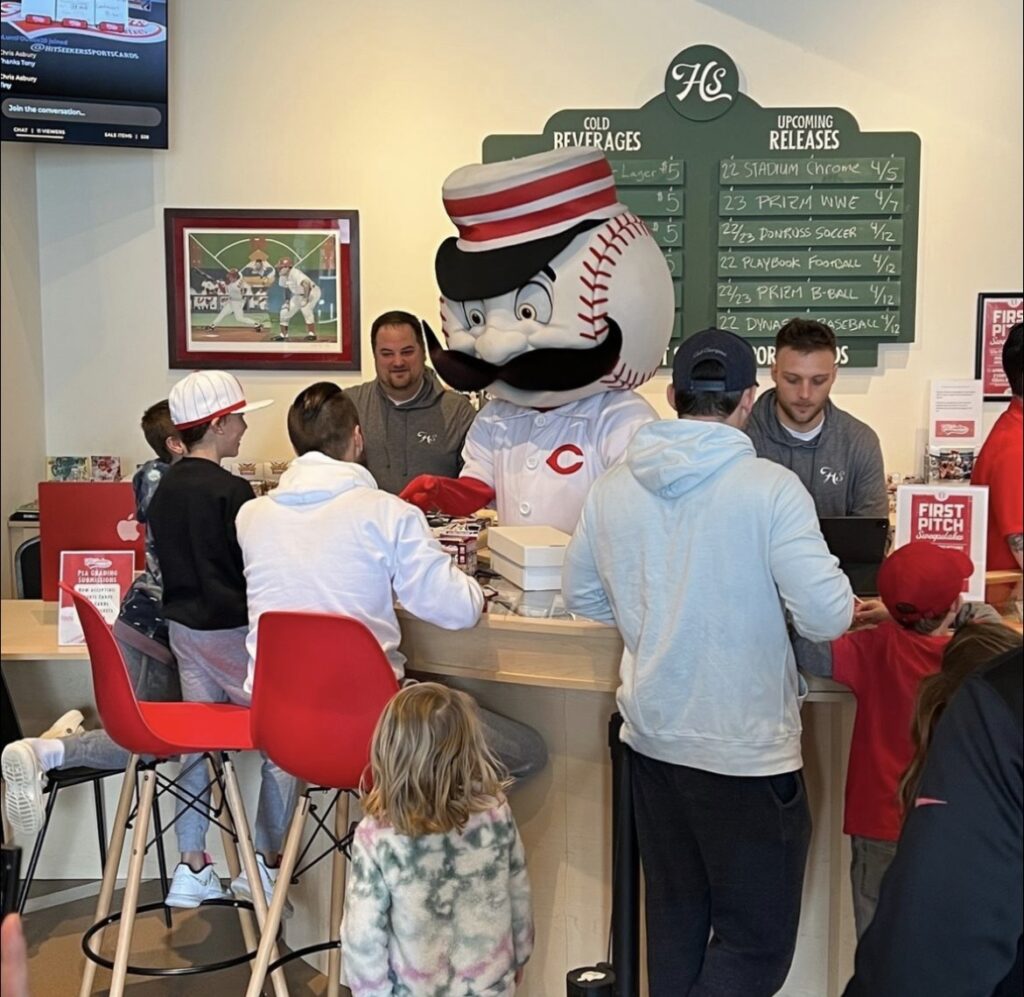
“Everything that we did to build this front is intentional,” Rouse said. “When you walk in the shop’s front door, it mirrors a baseball field. The first thing you’re greeted with is an Astroturf floor. That is cut out into an arc, and then there is painted concrete beyond it to simulate a warning track.”
Four hobby shops, four unique viewpoints on how owners appeal to their customers. “I think each shop can put their spin on how to do things that are memorable and unique, and it provides value to their customers,” Wilson said. “To me, the key is creating an experience. And there’s a bunch of different ways to do that.”